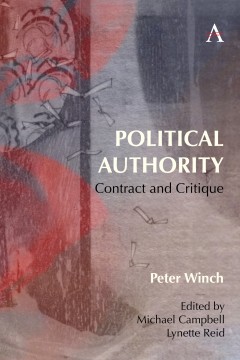Political Authority
Contract and Critique
By Peter Winch
Edited by Lynette Reid & Michael Campbell
Other Formats Available:
E-Book- About This Book
- Reviews
- Author Information
- Series
- Table of Contents
- Links
- Podcasts
About This Book
Winch is best known as the founder of post-war analytic philosophy of the social sciences, and as one of the rare post-war British philosophers who engaged with continental thought, in particular Simone Weil (on whom he wrote a book), Jürgen Habermas, and Karl-Otto Apel. Throughout his career, he also wrote on issues in political philosophy, with particular focus on questions to do with the legitimacy of the state and on the philosophies of Hobbes, Locke, Rousseau, and Simone Weil. Materials toward a book on the topic have lain in the Peter Winch archives since then, accessible only to philosophers able to visit in person. In this volume these notes are published in full, supplemented by selections from Winch's late lectures on law and authority and cross-referenced with his published discussions of political philosophy and related topics (e.g., punishment, agency).
In these unpublished writings, Winch diagnoses problematic assumptions about agency and about the relationship between language and society as these shape the social contract tradition. Winch’s critique of misconceptions of individual agency in political philosophy focuses the attention away from reasons for action discourse and toward the complex and socially constituted relations between agency, justice, and force. Following Wittgenstein’s injunction that a philosopher should always avoid hasty generalisation, Winch’s approach to questions of the legitimacy of the state is marked out by sensitivity to contextual features, including the needs and interests which influence the form that such questions take, whether those be securing peace in civil war (Hobbes), defending a nation from fascism (Weil), or rationalizing the seizure of indigenous lands by conquest (Locke).
In addition to its interest as a Wittgensteinian treatment of key questions in political philosophy, this volume supplements Winch’s published work on Wittgenstein, ethics, the social sciences, and Spinoza. This volume, the second to come from research of the Peter Winch archives, fills in our understanding of Winch's philosophical oeuvre, drawing out the implications of his work for questions in political philosophy. In addition, the volume contributes to the emerging picture of some post-war British philosophers resisting the impoverishment of narrow logical analysis and the disengagement of philosophy from life and society.
Reviews
Author Information
Peter Winch (1926–1997) was Professor of Philosophy at King’s College London and the University of Illinois Urbana-Champaign.
Lynette Reid is Associate Professor in the Department of Bioethics at Dalhousie University.
Michael Campbell is Assistant Professor in the Department of Ethics at Kyoto University.
Series
Table of Contents
Links
Stay Updated
Information
Latest Tweets



